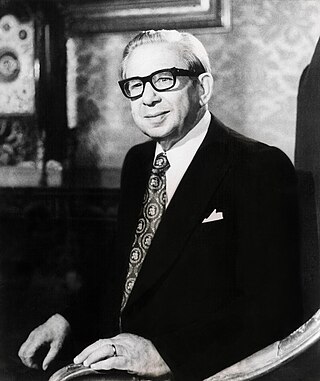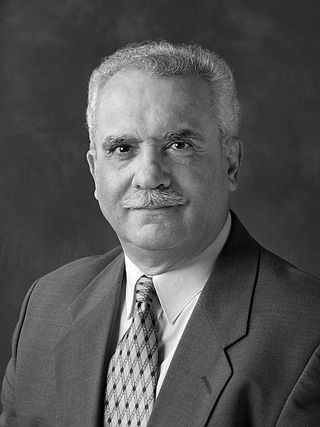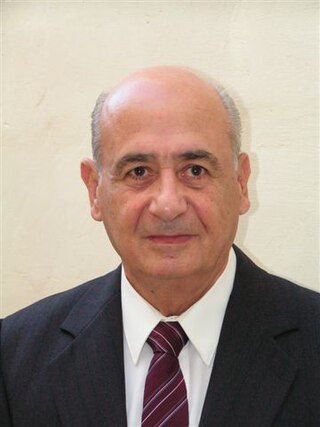Rużar Briffa (1906–1963) was a Maltese poet and dermatologist, and a major figure in Maltese literature.

Anton Buttigieg, was a Maltese political figure and poet. He served as the second president of Malta from 1976 until 1981.

Carmelo Psaila, better known as Dun Karm was a Maltese priest, writer and poet, sometimes called 'the bard of Malta'. He is widely recognised as the Maltese national poet.

Victoria, also known among the native Maltese as Rabat or by its title Città Victoria, is an administrative unit of Malta, and the main town on Gozo,. Victoria has a total population of 6,901, and by population, is the largest locality in Gozo.

The Akkademja tal-Malti was the prime regulatory body responsible for the Maltese language from the early 20th century up to the end of the millennium, when a government-sponsored law was passed to protect issues related to the national language. On joining the European Union, Maltese became one of the recognised languages of the EU.
Mikiel Anton Vassalli was a Maltese writer, a philosopher, and a linguist who published important Maltese language books, including a Maltese-Italian dictionary, a Maltese grammar book, the first Protestant Gospels in Maltese, and towards the end of his life, a book on Maltese proverbs.

Frans Sammut was a Maltese novelist and non-fiction writer.

Pawlu Aquilina was a Maltese poet and writer from Siġġiewi, Malta. He studied at the Archbishop's Seminary and St Michael's Training College for Teachers.
Louis Briffa is a Maltese poet.
Maltese literature is any literature originating from Malta or by Maltese writers or literature written in the Maltese language.

Ġużè Muscat Azzopardi was a Maltese lawyer, poet, novelist and social commentator. He studied in the Mdina Seminary, and in the University of Malta, where he graduated as a lawyer in 1875. He was married to Tonina Fenech, and had three sons Ivo and Ġino, who were both writers, and Anton, a composer.

Oliver Friggieri was a Maltese poet, novelist, literary critic, and philosopher. He led the establishment of literary history and criticism in Maltese while teaching at the University of Malta, studying the works of Dun Karm, Rużar Briffa, and others. A prolific writer himself, Friggieri explored new genres to advocate the Maltese language, writing the libretti for the first oratorio and the first cantata in Maltese. His work aimed to promote the Maltese cultural identity, while not shying from criticism: one of his most famous novels, Fil-Parlament Ma Jikbrux Fjuri, attacked the tribalistic divisions of society caused by politics. From philosophy, he was mostly interested in epistemology and existentialism.

Mary Meilak was a Maltese poet.

Canon Giovanni Pietro Francesco Agius de Soldanis, often called de Soldanis, was a Maltese linguist, historian and cleric from the island of Gozo. He wrote the first lexicon and systematic grammar of the Maltese language, and he was the first librarian of the Bibliotheca Publica, the precursor of the National Library of Malta.

Emanuel Benjamin Vella, also known as E. B. Vella, was a Maltese schoolteacher and writer. He was born in Mosta on 20 June 1898 to Clement Vella and his wife Carmela née Azzopardi. He was a member of the Maltese Writers Association. He died in Mosta on 2 May 1946. A primary school in Mosta is named after him.

Pietru Pawl Saydon, was a Roman Catholic priest and scholar of the Maltese language, other semitic languages and the Bible. He was President of the Maltese Language Society (Ghaqda tal-Malti) at the University of Malta. He is most noteworthy for his contributions to the Maltese language, and the translation of the Bible from the original Hebrew to Maltese.
Lina Brockdorff is a Maltese author, playwright and radio broadcaster.












